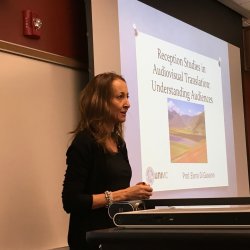Elena Di Giovanni on Audiovisual Translation: From Talks on Campus to New International Collaborations
Posted in: Inserra, Italian News and Events

An in-class talk and a workshop with visiting scholar Elena Di Giovanni (Universita’ di Macerata, Italy), guest of the Inserra Chair and the Italian Program for the third year in a row, concluded this year’s “Italian Translation Series.”
The first talk, entitled “Reception Studies in Audiovisual Translation: Understanding Audiences” and held on Nov. 17, was offered in connection with ITAL345 “Italian Translation for Tourism and Cultural Promotion” taught by Dr. Marisa Trubiano, while the latter took place on Tuesday Nov. 22 as a part of the Translation Lunch Series of the Center for Translation and Interpreting. Entitled “A Hands-on Workshop on Access Services for the Blind for Opera and Theater”, it addressed the topic of accessibility and live performance.
Students and teachers at Montclair State University responded enthusiastically to both presentations and to the perspective of future collaborations that have been taking shape as the interest for audiovisual translation gains ground on campus and international partnerships grow. “Elena Di Giovanni’s visit has served several purposes at once,” explained Dr. Teresa Fiore, Inserra Chair, “and we are very grateful that she accepted to come for the third time in three years (2016, 2015 and 2014). It’s pretty unique to have a guest speaker who not only shares her work in the course of public presentations but also her experience and projects to make them relevant to the hosting institution in many directions. First, talks about an international agreement with her university, the University of Macerata, are underway: the agreement will focus on student and faculty exchanges in the field of translation and communication. Secondly, synergies among students for special projects supervised by professors will start as early as Spring 2017 (the subtitling of a film to be screened on campus in April). Finally, shared research projects have been discussed and will take shape starting in 2017. Elena’s vast and well-respected knowledge in the field and her generosity are proving to be a great source of inspiration for faculty from different disciplines: she has provided multiple occasions for concrete advancement of the focus on translation in the Italian Program, with ramifications across many languages on campus.”
“Montclair State University seems to be the perfect place for translation training and research to flourish in the near future,” stated Di Giovanni. “Competent and passionate professors, curious and enthusiastic students, a rich environment and a host of potential active partners should soon come together to give life to an ever growing translation training and research unit, a reference point in the USA.” “We are working hard to translate what we are learning about the booming Macerata translation program into new curricular developments in the Italian Program and our Department,” said Trubiano.
Students who were new to the specific subject of the presentation on audio descriptions expressed their surprise and interest about the service that this type of translation can provide to people of diverse abilities. As Italian major Rosanna Coviello put it, “this event definitely broadened my knowledge on audiovisual media and translation. It showed me another way translation can help people.” Students usually associate translation simply with the bridging of different languages and cultures, but thanks to Elena Di Giovanni’s subtle observations they realized that the lack of knowledge of the language spoken in a place one visits can create obstacles for anyone, challenging their ability to fully function in that society. In this sense audio-descriptions allow for a re-drawing of boundaries and offer ways of effectively overcoming them.
“Elena Di Giovanni’s talk on understanding audiences was extremely inspiring and helped us think more deeply about what it is to walk in somebody else’s shoes in the context of translation,” shared Dr. Laurence Jay-Rayon Ibrahim Aibo, director of the Center for Translation and Interpreting. “What is the real audience of a given translation? What are the needs and expectations of a particular audience? How big is the gap between what we, as translators, imagine they need, and what they really need? I immediately engaged my French translation students with the salient aspects of Di Giovanni’s presentation since these students are translating training materials into French for Congolese refuges in partnership with the International Rescue Committee. It helped us focus harder on imagining what this particular audience of resettled immigrants already knew, and what they needed. Elena Di Giovanni’s talk has inspired us to reach out to them and start a real conversation.”
